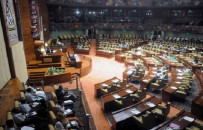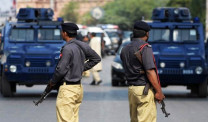Revamping the civil service: ‘It’s time to reconsider quota system’
Former senior bureaucrats say policy should be on a merit basis to curb favouritism.

The job services quota system has been in place for the 40 years, but many are questioning whether it has delivered what it set out to achieve.
Former senior bureaucrats say it hasn’t – in fact, they’re calling for a complete overhaul of the system and an in-depth analysis of the policy’s outcome.
Article 27 of the 1973 Constitution had provided safeguards against discrimination in services on grounds of race, religion, caste, sex, residence or place of birth. The idea behind this was to promote the interests of people living in less developed areas.
The quota system, which was created as an exception to this rule, is set to expire in August 2013. Roedad Khan, who has held the posts of Sindh chief secretary and Khyber-Pakhtunkhwa (K-P) chief secretary before his retirement, is sceptical about whether it should continue.
“The whole question [of the quota system] needs to be looked at afresh by a high level commission, perhaps headed by a Supreme Court judge, which must examine in depth what have we achieved since this policy began,” he said.
According to the current recruitment policy listed at the Central Superior Service of Pakistan website, only 10% of posts are reserved for merit.
Khan suggested that one should look into the possibility of changing the policy so that jobs were granted on a 100% merit basis. He said one should also re-evaluate the policy’s dependence on a domicile.
The quota system, Roedad Khan recalled, was introduced in 1949. But back then, the quota system made sense – the newly created country was in disarray. “Pakistan inherited only one Indian Civil Services officer at the time of its creation,” he recalled.
Later, after Pakistan lost its Eastern wing, the 1973 Constitution laid down an updated set of rules for the quota system that remains in place till today.
“There should be no quota in Punjab to begin with. They have several competent candidates there who can compete on merit,” Khan said. He said the same applied to Karachi and most of K-P.
He did clarify, however, that exceptions could be made for some tribal areas of K-P and Balochistan.
Another retired Sindh chief secretary, Kunwar Idrees, said, “The quota system should be renamed the ministers’ quota system ... What matters now is whether a minister is bent upon giving the jobs to his Mohajir, Sindhi or Pathan supporters,” he said.
Idrees also suggested reforms, saying a quota should be allocated to backward areas only, whether that’s Balochistan or Dera Ghazi Khan in Punjab.
However, he warned of the political ramifications of such a move. He recalled that language riots began when former prime minister Zulfikar Ali Bhutto introduced a special quota system in Sindh. “...That is why the system gets extended after every few decades – no one wants to deal with those problems,” he said.
Former Inspector General of Sindh Afzal Shigri suggested that reforms should be made gradually. “One can increase the allocation of merit seats from the existing 10% to 20% and perhaps revise it again after another 10 or 20 years,” he said.
Sindh’s dilemma
The quota system in Sindh is different from the rest of the provinces. Within its share of 19 %, it is further sub-allocated into two parts: Urban areas; namely Karachi, Hyderabad and Sukkur [40 % of 19 %, or 7.6 %]; and rural areas [60 % of 19 %, or 11.4 %].
Idrees says it is because of this unique quota system in Sindh that any talk of reforms can spark riots between the Mohajir and Sindhi communities.
Muttahida Qaumi Movement lawmaker Waseem Akhtar says the party’s stance from the very beginning has been that the quota system creates discrimination and must be abolished.
Pakistan Peoples Party’s Taj Haider said that while the rationale of the quota system was to facilitate those who didn’t have adequate educational opportunities, the dilemma, he said, is that “our education system is producing ignorant people.”
Published in The Express Tribune, July 17th, 2012.



















COMMENTS
Comments are moderated and generally will be posted if they are on-topic and not abusive.
For more information, please see our Comments FAQ